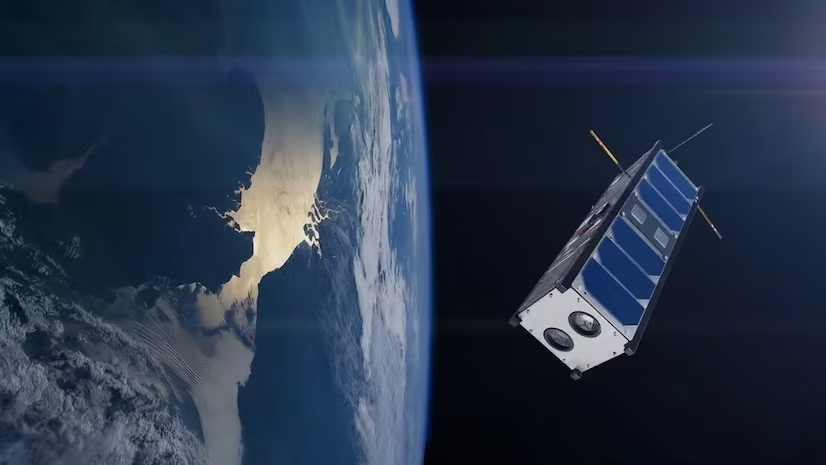AI Laboratory in Space:
The era of space exploration is witnessing a revolution, and India is firmly at the forefront of this transformation. Hyderabad-based space technology firm TakeMe2Space is gearing up to launch MOI-TD (My Orbital Infrastructure – Technology Demonstrator), India’s first AI laboratory in space. Scheduled for mid-December 2024 aboard ISRO’s PSLV C60 launch vehicle, this groundbreaking mission is set to redefine the way we think about space research, satellite operations, and data processing.
The Vision Behind MOI-TD: Affordable and Accessible Space Research
For decades, the space sector has been accessible only to governments and large organizations due to its high costs and technical challenges. TakeMe2Space’s vision is to change this by leveraging artificial intelligence and on-orbit computing to make space research affordable and accessible for researchers, educators, and even students.
“MOI-TD will demonstrate the ability to open up the space industry, specifically Earth Observation, to millions of space enthusiasts, researchers, and small companies,” says Ronak Kumar Samantray, Founder and CEO of TakeMe2Space. “The space sector has long been restricted to a select few. This needs to change to unlock the true potential of human creativity in space exploration and research.”
With MOI-TD, TakeMe2Space is not just launching a satellite—it is democratizing space.
Why an AI Laboratory in Space?
One of the most pressing challenges in satellite operations today is the massive amount of data generated. Satellites capture petabytes of data daily, but a significant portion—up to 40%—can be unusable due to factors such as cloud cover. Traditionally, all this data is transmitted back to Earth for processing, a time-consuming and costly endeavor.
Here’s where MOI-TD comes in. The satellite, equipped with advanced AI laboratory in space and computing capabilities, processes data directly in orbit. This approach delivers real-time, relevant insights to users while significantly reducing the cost and latency of data transmission.
Imagine a world where environmental monitoring, deforestation tracking, or greenhouse gas detection happens almost instantly, instead of waiting weeks for satellite data to be analyzed. With the MOI-TD platform, this vision becomes a reality.
OrbitLab: Empowering Space Research for Everyone
Central to the MOI-TD mission is OrbitLab, a web-based console that allows users to access the satellite platform with ease. Through OrbitLab, users can upload AI models for various applications, such as:
- Environmental monitoring
- Deforestation tracking
- Maritime activity observation
- Greenhouse gas emission detection
- Custom Earth observation use cases
This innovative satellite-as-a-service platform has already attracted its first research partners, including a leading Malaysian university and a group of 9th and 10th-grade students from an Indian school. By enabling access to state-of-the-art space technology, OrbitLab is set to democratize space research, empowering a new generation of innovators and researchers in AI laboratory in Space.
Cutting-Edge Technology Behind MOI-TD
The MOI-TD platform is a marvel of engineering and innovation. It integrates several advanced hardware and software components to deliver optimal performance:
- AI Accelerator: For real-time data processing and machine learning applications in orbit.
- Onboard Computer: A powerful processor for handling computational workloads.
- Reaction Wheels and Magnetorquers: For precise satellite positioning and control.
- Flexible Solar Cells: Designed to provide sustainable power for future missions.
The mission also builds on TakeMe2Space’s successful demonstration of radiation shielding technology earlier this year aboard PSLV C-58. This advancement promises to extend satellite mission lifespans, making space-based computing more viable for long-term projects.
Collaboration with IN-SPACe
TakeMe2Space owes part of its success to IN-SPACe (Indian National Space Promotion and Authorization Center), the government agency dedicated to fostering private-sector participation in the Indian space ecosystem.
All testing and evaluation of the MOI-TD platform were conducted at the IN-SPACe Technical Centre in Ahmedabad, which offers state-of-the-art facilities for satellite testing and validation. This collaboration highlights the critical role of public-private partnerships in advancing India’s space ambitions.
TakeMe2Space plans to continue leveraging IN-SPACe’s resources for future missions, building on the strong foundation of this partnership.
Paving the Way for Space-Based Data Centers
While MOI-TD focuses on Earth observation applications, the technology it demonstrates is just the beginning. The mission is a critical step toward developing space-based data centers—a concept that could transform how we process and store data.
Though currently 10–15 times more expensive than terrestrial alternatives, space-based data centers offer several advantages:
- Environmental Benefits: By reducing the need for energy-intensive terrestrial data centers, space-based solutions could have a smaller carbon footprint.
- Latency Reduction: With data processing happening closer to the source, users benefit from faster insights.
- Global Connectivity: Space-based data centers can provide services to remote or underserved regions where terrestrial infrastructure is limited.
The MOI-TD mission represents the first step toward realizing this vision, showcasing the potential of AI and cloud computing in orbit.
Democratizing Space Research: A New Era
The launch of MOI-TD marks a significant milestone not just for India, but for the global space industry. By making space research accessible and affordable, TakeMe2Space is ushering in a new era of exploration and innovation.
Through platforms like OrbitLab, the company is empowering individuals, schools, and small organizations to participate in space research—an opportunity once reserved for well-funded institutions.
TakeMe2Space’s mission aligns with the growing global focus on inclusive innovation, proving that space is not just for governments and billion-dollar corporations. It is for everyone.
Looking Ahead
As the mid-December 2024 launch date approaches, anticipation is building for what could be a game-changing mission for the space industry. MOI-TD is not just an AI laboratory in space—it is a symbol of India’s growing leadership in space technology and innovation.
By addressing the fundamental challenges of satellite operations and introducing real-time data processing in orbit, TakeMe2Space is paving the way for a future where space research is truly democratized and sustainable.
Stay tuned as India’s AI laboratory in space embarks on its journey to inspire millions and redefine the possibilities of human creativity in space exploration.

1 thought on “India’s TakeMe2Space Set to Launch AI Laboratory in Space”